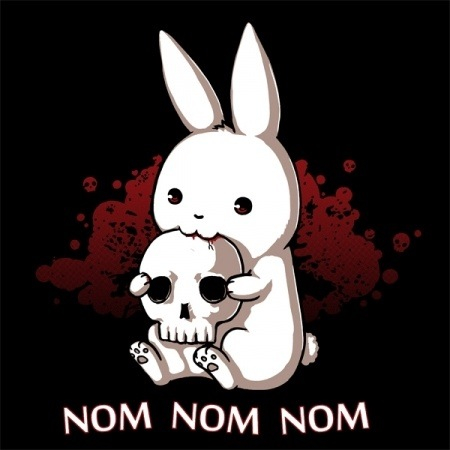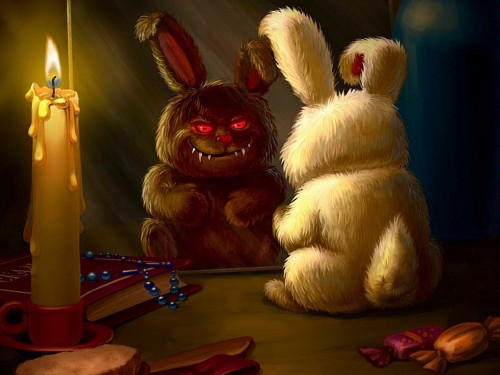 I visit beauty sites quite often. This is a thing to do when one’s life is a sequined distillation of anxiety or tragic Debbie Gibson video. While looking for an eyeliner with sufficient grit, I thought of curating a series of interviews for HTMLGIANT on beauty and health. I tweeted that I thought it would be cool and sad, especially regarding the grooming habits of writers in whatever mundane/metaphorical/actual ways they manifest themselves. I talked to Gene about it, and he had just upped his routine to something containing algae, and BEAUTY BY HTMLGIANT was born. The first installment will feature Leesa Cross-Smith, author of EVERY KISS A WAR. It is expensive to be sane.
I visit beauty sites quite often. This is a thing to do when one’s life is a sequined distillation of anxiety or tragic Debbie Gibson video. While looking for an eyeliner with sufficient grit, I thought of curating a series of interviews for HTMLGIANT on beauty and health. I tweeted that I thought it would be cool and sad, especially regarding the grooming habits of writers in whatever mundane/metaphorical/actual ways they manifest themselves. I talked to Gene about it, and he had just upped his routine to something containing algae, and BEAUTY BY HTMLGIANT was born. The first installment will feature Leesa Cross-Smith, author of EVERY KISS A WAR. It is expensive to be sane.
BEAUTY BY HTMLGIANT
WHAT BOX? Talking with Lance Olsen on FC2’s 40th Birthday
Founded in 1974, FC2 is one of America’s best-known ongoing literary experiments and progressive art communities. In honor of FC2’s fortieth birthday, publisher Lance Olsen has generously answered the following questions about publishing, longevity, and innovation.
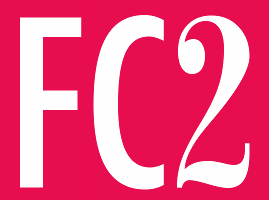
***
Rachel: What is FC2?
Lance: FC2—short for Fiction Collective Two—is a small, independent, not-for-profit press run by and for innovative authors. One of America’s best-known ongoing literary experiments and progressive art communities, for the last 40 years FC2 has dedicated itself to bringing out work too challenging or heterodox for the commercial milieu. Originally founded in 1974 as Fiction Collective by a handful of writers—Ronald Sukenick, Raymond Federman, and Jonathan Baumbach among them—FC2 has so far published more than 200 books by more than 100 authors.
Rachel: What does FC2 mean to you?
Lance: FC2 is an ongoing investigation into what innovative writing means—and that meaning is continuously in flux. One of the great joys for me about our editorial meetings, which take place once or twice in the fall, and once or twice in the spring, is that they make up an ongoing conversation about such troubled and troubling terms as “cutting-edge,” “artistically adventurous,” and “experimental.”
Those terms mean something else now than they did in, say, 1974; will mean something next Tuesday than they did last Monday; will mean something different to one person than to another—which is to say such terms are inherently unstable ones, open to ongoing modification, depending on who you are, where you are, what you’ve read, and so on. That is, they are terms always-already in-process.
By my lights, at the heart of them are a series of implied questions: what is narrative? what are its assumptions? what are its politics and social dynamics? its limits? how does narrative engage with the problematics of representation? identity? temporality? gender? genre? ideas of “literature” and “the literary”? authorship? readership and the act of reading in the twenty-first century?
In other words, perhaps a fruitful way of approaching a tentative definition of such narrativity—represented with respect to FC2 by such diverse authors as Lucy Corin and Brian Evenson, Cris Mazza and Amelia Gray, Michael Martone and Stephen Graham Jones, Matt Kirkpatrick and Samuel R. Delany, Michael Joyce and Clarence Major, Vanessa Place and Hilary Plum, Joanna Ruocco and Leslie Scalapino, Melanie Rae Thon and Yuriy Tarnawsky, Steve Katz and Mac Wellman, Diane Williams and Lidia Yuknavitch—might be to suggest it is the sort that includes a self-reflective awareness of and engagement with theoretical inquiry, concerns, and obsessions.
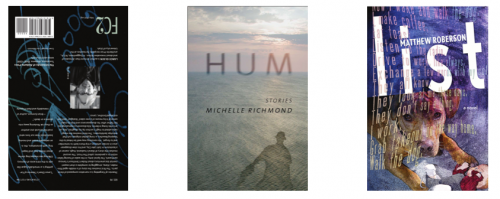
What’s the scariest book you’ve ever read?
Or, what book are you most afraid to read?
Naiza H. Khan, from ArtAsiaPacific, 2013
Visual artist Naiza H. Khan was born in Pakistan in 1968. And though her career has circled the globe (she has held positions in the US and UK, and came up in the Ruskin School at the University of Oxford) Pakistan remains central in her artistic imagination. A new monograph out from ArtAsiaPacific gives an exciting look at twenty-five years of Khan’s compelling and explicitly feminist work. READ MORE >
April 24th, 2014 / 12:00 pm
High Fives
Cool poem-video of “High-Fives” by Ben Mirov from his poetry collection Hider Roser, (Octopus Books). The video was directed and produced by Dan Lichtenberg:
April 23rd, 2014 / 10:00 am
25 Points: Atalanta (Acts of God)
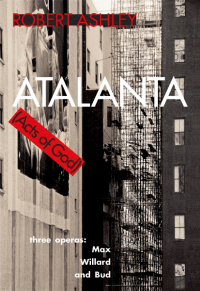 Atalanta (Acts of God)
Atalanta (Acts of God)
by Robert Ashley
Burning Books, 2011
208 pages / $25.00 buy from Amazon or SPD
24. When I began this review Robert Ashley was alive. In light of his death, I feel a compulsion to redraft and make these twenty-five points address something more. I want to talk about seeing Foreign Experiences and Lectures to Be Sung performed, about composition and improvisation, contemporary opera, and the intersection of music and language. Ashley’s work is full of good discussions. I’m attracted to the just-some-dude delivery style and storytelling aspects in the operas. One of my composer pals can’t follow the stories at all, and seems obsessed with the involuntary speech in Ashley’s work. Ashley’s work is so dense, and there are so many lessons that I take away from his work as a performer and writer. It’s hard to limit the discussion, especially given this kind of retrospective appreciation and the span of his work.
April 22nd, 2014 / 12:00 pm
Cultural Violence Illustrated
Inequality continues to take dramatic new forms, evolving and building on itself at the speed of transaction and at an inconceivable scale with a voided structure that can be more easily compared to a feudal economy than an economy of the 20c Post War period of American power.

……National Poetry Month Death Match #1……
April, because of National Poetry Month, is a traumatic ordeal of a time for me.
A prevailing, I guess, part of me thinks “What a total bunch of fucking bullshit”– and for the past few years all April long I’m in a grouchy stupor-rage making snide and mean remarks, pissing on anything even remotely “poetry,” and relentlessly posting up pictures of beached whale carcasses.
And yet–a part of me identifies with this impressive cadre and camaraderie of poetry munchkins gathered squawking and encouraging and reassuring each other on the cliffs of poetry each April because, well, it must be a good thing. It must be, right?
And so this year I’ve decided to face the disturbing contraries of my soul and the way they bristle and soft-feather up at National Poetry Month by setting up, as any good Caesar of the soul, some death matches. And in each case the death match will consist of a “for” and “against” stance fought out between two of my friend surrogates. And in each case I’ll stand up above the fray with thumb at the ready.
******
And, the first death match is between Reb Livingston and Jereme Dean.
******
NaPoWriMoHoHoHo
by Reb Livingston
What’s ruining/killing poetry this month? Well, it’s April so that must mean the culprit is National Poetry Month. Or so claims my anti-NaPoMo poet pals on social media.
April 21st, 2014 / 3:10 pm
You Can Make Anything Sad by Spencer Madsen
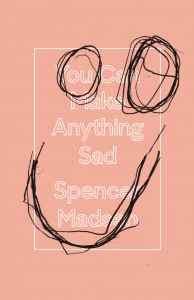 You Can Make Anything Sad
You Can Make Anything Sad
by Spencer Madsen
Publishing Genius, April 2014
90 pages / $10 Preorder from Publishing Genius
Spencer Madsen’s latest book, You Can Make Anything Sad, seems to be a response to a question Spencer asks himself within the poems he writes: Who am I and what am I doing? The poems constantly shift in image, but seem to stay in a general area of themes and moods. He plays with his voice, and style, to create something that feels very much completed, while at the same time quite fragile and open. It’s sincerely insincere, approaching the mundane as if it was wondrous, and the wondrous as if it was mundane.
I move back to Facebook, I type:
If you feel an aversion to me and I don’t feel an aversion to
you, please don’t feel an aversion to me.
I think about how my parents had hoped for more.
I think about letting them down constantly.
I think, at least I’m not a murderer.
Mostly because murderers are very ambitious.
April 21st, 2014 / 10:00 am
Lydia Davis Can and Will
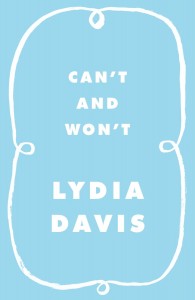 Can’t and Won’t
Can’t and Won’t
by Lydia Davis
Farrar, Straus and Giroux, April 2014
304 pages / $26 Buy from Amazon
Lydia Davis’ Can’t and Won’t is the latest offering from an author who, over the past few decades, has consistently confused notions of genre within literary fiction. A writer mostly of short fiction and a translator, notably, of Proust and Flaubert (whose letters supply the language for one series of pieces in the book), Davis is as at home with the authors of the late-twentieth century French avant-garde as she is with those of the nineteenth-century high-realist novel. As they do in all of her books, her stories work with minutiae of language and experience that are broadly accessible in ways that cannot be called simply conventional or experimental.
April 21st, 2014 / 10:00 am

